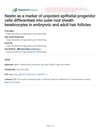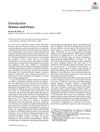 November 2022 in “CARDIOMETRY”
November 2022 in “CARDIOMETRY” A group has developed therapies that show promise for treating cancer and various other conditions.
 September 2022 in “Farmacja Polska”
September 2022 in “Farmacja Polska” Biotin is important for health, but taking extra usually doesn't help unless you're deficient.
 September 2022 in “Research Square (Research Square)”
September 2022 in “Research Square (Research Square)” Caffeic acid helps protect rats from the harmful effects of acrylamide.
 August 2022 in “Research Square (Research Square)”
August 2022 in “Research Square (Research Square)” Implanted special stem cells from hair follicles helped heal wounds faster and with less scarring in mice.
 June 2022 in “Research Square (Research Square)”
June 2022 in “Research Square (Research Square)” Nestin-expressing cells turn into a specific type of skin cell in hair follicles during development and in adults.
 May 2022 in “Research Square (Research Square)”
May 2022 in “Research Square (Research Square)” Nestin marks cells that can become a specific type of skin cell in hair follicles of both developing and adult mice.
 May 2022 in “Gastroenterology”
May 2022 in “Gastroenterology” Targeting NETs may help reduce fibrosis in Crohn's disease.

No single biomarker is reliable enough for diagnosing and assessing SLE.
 January 2022 in “International journal of zoological investigations”
January 2022 in “International journal of zoological investigations” Polycystic Ovarian Syndrome is common in overweight urban college girls and may increase the risk of heart and metabolic problems.
 September 2021 in “Physiology News”
September 2021 in “Physiology News” Addressing underrepresentation in Parkinson's research is crucial for better treatments and understanding.
 September 2021 in “Physiology News”
September 2021 in “Physiology News” Air Vice-Marshal Sir Ralph Jackson significantly advanced dialysis technology in the UK.

Researchers found a genetic link for hereditary hair loss but need more analysis to identify the exact gene.
 June 2021 in “bioRxiv (Cold Spring Harbor Laboratory)”
June 2021 in “bioRxiv (Cold Spring Harbor Laboratory)” Gene therapy in mice increased lifespan and improved health without causing cancer.

Metformin helps manage weight, blood pressure, and hormonal imbalances in PCOS patients.
 November 2020 in “Elsevier eBooks”
November 2020 in “Elsevier eBooks” Antiandrogens and androgen inhibitors like spironolactone, finasteride, and dutasteride can treat hair loss and skin conditions, but they have risks and side effects, including potential harm to pregnant women and risks of cancer and heart issues. Herbal remedies also have antiandrogenic effects but lack safety validation.
 September 2020 in “bioRxiv (Cold Spring Harbor Laboratory)”
September 2020 in “bioRxiv (Cold Spring Harbor Laboratory)” Different fish use the same genes to regrow teeth.
 June 2020 in “bioRxiv (Cold Spring Harbor Laboratory)”
June 2020 in “bioRxiv (Cold Spring Harbor Laboratory)” The HoxC gene cluster and its enhancers are essential for developing hair and nails in mammals.
 June 2020 in “Journal of Dermatological Treatment”
June 2020 in “Journal of Dermatological Treatment” Use telemedicine and strict hygiene for safe hair and scalp treatments during COVID-19.
 January 2020 in “Der Pharmacia Lettre”
January 2020 in “Der Pharmacia Lettre” Nanoparticle-based herbal remedies could be promising for treating hair loss with fewer side effects and lower cost, but more research is needed.
January 2020 in “Proyecto de investigación:” Longer anogenital distance may indicate a higher chance of having polycystic ovary syndrome, and measuring this distance along with hormone levels could improve diagnosis.
 January 2020 in “International Journal of Research”
January 2020 in “International Journal of Research” High testosterone increases heart disease risk in women with PCOS.
 August 2019 in “Journal of Invertebrate Pathology”
August 2019 in “Journal of Invertebrate Pathology” Thymosin beta 4 protects cells from damage by blocking a harmful microRNA and boosting a protective gene.
 April 2019 in “Journal of Investigative Dermatology”
April 2019 in “Journal of Investigative Dermatology” New vitamin D3 forms need the vitamin D receptor to reduce fibrosis in human cells.
 April 2019 in “Journal of Investigative Dermatology”
April 2019 in “Journal of Investigative Dermatology” DPP4-positive fibroblasts play a major role in producing proteins that lead to skin fibrosis.
 April 2019 in “Journal of Investigative Dermatology”
April 2019 in “Journal of Investigative Dermatology” Fractional photothermolysis helps wounds heal with minimal scarring.
 April 2019 in “Journal of Investigative Dermatology”
April 2019 in “Journal of Investigative Dermatology” BRG1 is essential for skin cells to move and heal wounds properly.
 January 2019 in “Springer eBooks”
January 2019 in “Springer eBooks” Modified HDL can better deliver drugs and genes, potentially improving treatments and reducing side effects.
 December 2018 in “Lasers in Surgery and Medicine”
December 2018 in “Lasers in Surgery and Medicine” Science improves peace by advancing medical treatments, like laser therapies and non-invasive imaging.
 November 2018 in “Atlas of genetics and cytogenetics in oncology and haematology”
November 2018 in “Atlas of genetics and cytogenetics in oncology and haematology” WNT10B is linked to cancer development and affects survival and disease progression in various cancers.

Sinsun-yukza-hwan extract promotes hair growth in mice.





























